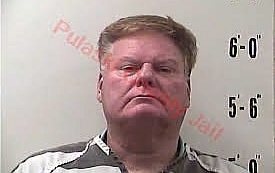 On Tuesday, August 8, a Pulaski County Grand Jury handed down indictments for former Pulaski County Sheriff Michael Gayer and his Chief Deputy, Ronnie “Ron” Patrick. Gayer, whose term as Sheriff ended in 2014, turned himself in to the Pulaski County Jail later that night and was released after posting bond. Patrick has yet to be arrested, but arrangements have been made for his surrender at the Marshall County Jail.
On Tuesday, August 8, a Pulaski County Grand Jury handed down indictments for former Pulaski County Sheriff Michael Gayer and his Chief Deputy, Ronnie “Ron” Patrick. Gayer, whose term as Sheriff ended in 2014, turned himself in to the Pulaski County Jail later that night and was released after posting bond. Patrick has yet to be arrested, but arrangements have been made for his surrender at the Marshall County Jail.
Marshall County Prosecutor, E. Nelson Chipman, Jr., was appointed as special prosecutor to investigate and determine the appropriate course of action. The Indiana State Police, with detectives headquartered at the Lowell ISP Post, were the lead investigators. Assistance was rendered by investigators from the Pulaski Prosecutor’s Office and the Special Investigations Division of the Indiana State Board of Accounts.
Chipman, as is his policy and practice in cases involving allegations of criminal conduct by public officials, active or retired, chose to present the investigative findings to a panel of Pulaski County citizens sitting on a Grand Jury convened by Pulaski Circuit Court Judge Michael Shurn.
Chipman, together with deputy prosecutors Lynn Berndt and Matt Sarber, and with the assistance of legal intern Anna Rich, presented evidence through numerous witnesses to the grand jury over the course of two days beginning on Monday, August 8.
 The indictment formally charged Gayer with seven counts ranging from theft, obstruction of justice, deception, and official misconduct. Eleven similar counts were lodged against former Chief Deputy Ron Patrick. All the charges against both men relate to firearms found to be missing from the Pulaski County Sheriff’s Department inventory and items missing from evidence storage at the department. The items were not discovered missing until current Sheriff Jeffrey Richwine took office and ordered an inventory conducted, and sought the assistance of the Indiana State Board of Accounts. Copies of the indictments accompany this press release.
The indictment formally charged Gayer with seven counts ranging from theft, obstruction of justice, deception, and official misconduct. Eleven similar counts were lodged against former Chief Deputy Ron Patrick. All the charges against both men relate to firearms found to be missing from the Pulaski County Sheriff’s Department inventory and items missing from evidence storage at the department. The items were not discovered missing until current Sheriff Jeffrey Richwine took office and ordered an inventory conducted, and sought the assistance of the Indiana State Board of Accounts. Copies of the indictments accompany this press release.
As in any criminal case, the defendants are presumed innocent until or unless a jury or judge determines guilt beyond a reasonable doubt at a trial. The charges in the indictments are merely allegations.














